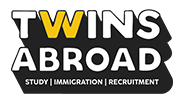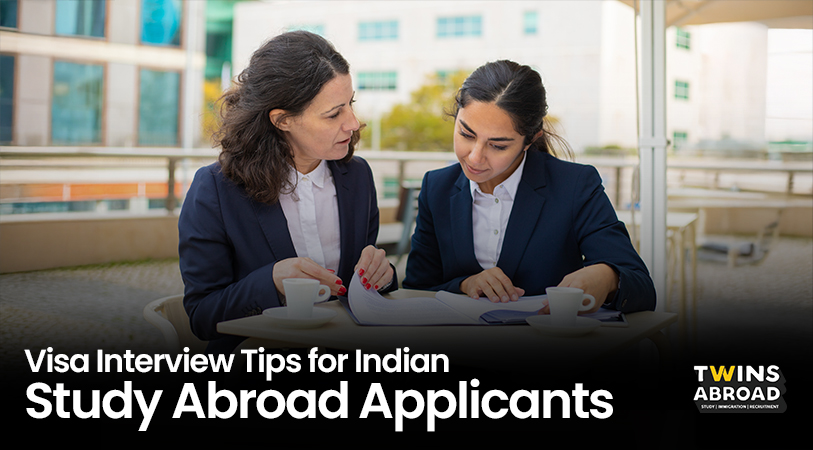Visa Interview Tips for Indian Study Abroad Applicants
When you’ve made the decision to study abroad, the visa interview is one of the most critical steps in your journey. It’s where you demonstrate your genuine intent to study in a foreign country and prove that you meet the requirements to obtain a student visa. For Indian applicants, visa interviews are often the final hurdle before being granted permission to study abroad.
A successful visa interview is essential, not just to get your visa, but to set the stage for your life abroad. The questions may seem daunting, but with the right preparation, you can face the interview confidently. This blog will provide you with comprehensive tips to help you succeed in your visa interview, ensuring you leave a positive impression on the consular officer.
Understanding the Importance of the Visa Interview
Before diving into specific tips, it’s important to understand the significance of the visa interview. The purpose of the interview is to assess your intent to study abroad and verify that you are financially stable, well-prepared, and committed to returning to India after your studies. A consular officer’s decision is based on various factors, including your financial background, academic history, and overall intentions.
While the visa officer may follow a standard set of questions, it’s your responses, your demeanor, and your preparedness that can influence the outcome. A well-prepared applicant demonstrates sincerity and professionalism, while a poorly prepared one may raise doubts about their eligibility or intentions.
Preparing for the Visa Interview: The Basics
1. Know Your Application Inside Out
Before your visa interview, thoroughly review your application and the supporting documents you submitted. Be prepared to answer any questions about your academic history, your chosen university or course, and your reasons for studying abroad. Familiarity with your application shows the consular officer that you are serious and have thought through your decision to study abroad.
2. Research the Country and University
Make sure you have a good understanding of the country you are applying to. The visa officer may ask why you chose that specific destination, and having a clear answer will demonstrate your genuine interest in studying there. Similarly, be ready to explain why you selected your chosen university and program. Understand the course structure, faculty, and how it aligns with your career goals.
3. Organize Your Documents
Ensure that all required documents are in order and easily accessible. This includes:
- Passport (valid for at least six months)
- Visa application form
- Visa fee receipt
- Acceptance letter from the university
- Financial documents (bank statements, affidavits of support, etc.)
- Test scores (IELTS, TOEFL, GRE, etc.)
- Transcripts and academic records
- Passport-size photographs
Organizing your documents in a folder or file will not only help you stay calm during the interview but also make a good impression on the officer.
Key Tips to Ace Your Visa Interview
1. Be Confident, Calm, and Professional
Confidence is crucial during your visa interview. Walk into the consulate with a positive attitude, a firm handshake, and an air of professionalism. First impressions matter, so dress appropriately—business casual attire is recommended. Avoid being overly nervous, as it can make you appear unsure of yourself. Remember, the officer is just doing their job, and your goal is to convey your sincerity and preparedness.
2. Answer Questions Clearly and Honestly
The visa officer will ask a variety of questions to assess your intent and eligibility. Answer each question clearly and concisely. Avoid rambling or giving vague answers. Most importantly, be honest. If you’re asked about your academic history, your family background, or your financial situation, provide truthful responses. Being caught in a lie can result in your visa application being rejected.
3. Know Why You Chose Your Program and University
A common question in visa interviews is why you have chosen a particular program or university. Be prepared to explain how this course fits into your academic and career goals. Talk about how the program will help you develop relevant skills and enhance your future prospects. Mention any specific features of the program that attracted you, such as unique course offerings or opportunities for internships.
4. Explain Your Financial Situation
One of the main concerns of visa officers is whether you have sufficient funds to cover your tuition fees and living expenses abroad. Be prepared to answer questions about how you plan to finance your education. You should have clear documentation that shows you or your family can afford your studies. Be ready to explain any loans you’ve taken, and provide details on your bank statements, sponsorships, or affidavits of support.
5. Demonstrate Strong Ties to India
The visa officer wants to ensure that you have the intent to return to India after your studies. Strong ties to India, such as family, property, or a job offer, are important indicators that you plan to return. Be ready to talk about your future plans in India. For example, you might mention your career aspirations, how your degree will help you achieve those goals, or how your family and social commitments bind you to India.
6. Be Ready for Questions About Your Post-Graduation Plans
The officer may ask questions about your plans after completing your studies. Be clear about whether you intend to return to India or stay in the country where you’re studying. If you plan to return, explain how your degree will contribute to your career in India. If you’re considering staying back, ensure you know the work visa or post-graduation visa options available to you, and express your long-term intentions to contribute to your home country.
How to Handle Difficult or Unexpected Questions
Sometimes, the visa officer may ask unexpected or challenging questions. Here’s how to handle them:
- Stay Calm: If you don’t know the answer, don’t panic. Take a moment to think and then respond thoughtfully.
- Be Honest: If you don’t have an immediate answer or aren’t sure about something, it’s better to be honest than to guess.
- Don’t Over-Explain: If the officer asks a simple question, provide a clear and concise answer without over-explaining. Too much information can make your response seem rehearsed or overly defensive.
Conclusion
Your visa interview is a pivotal moment in your study abroad journey. With adequate preparation, confidence, and the right attitude, you can present yourself as a serious, well-prepared applicant who is ready to contribute to the academic community abroad. The tips outlined in this blog should help you navigate the interview process smoothly.
Remember that every visa officer is different, and the questions can vary. However, by focusing on presenting your genuine intent to study, providing clear answers, and demonstrating your financial stability and ties to India, you can increase your chances of a successful visa application. Good luck, and remember to stay calm and confident!


Leave a Reply